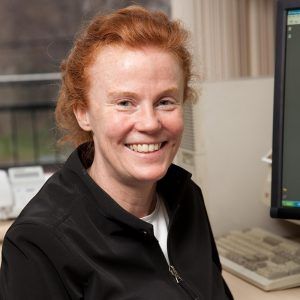 Dr. Elizabeth Claus would prefer that brain tumor treatment was more like a game of Jeopardy: you already have the answers and guess the questions.
Dr. Elizabeth Claus would prefer that brain tumor treatment was more like a game of Jeopardy: you already have the answers and guess the questions.
But while in training to become a neurosurgeon at Yale-New Haven Hospital in Connecticut, Claus quickly realized that there were many more questions than answers when it came to identifying risk factors and treatments for brain tumor patients.
“The study of relatively rare diseases such as primary brain tumors remains a significant challenge,” she says, explaining that traditionally, researchers identify large numbers of participants required for studies through population or hospital-based tumor registries. Because each registry includes only a small number of potential study subjects, the study becomes prohibitively costly, labor-intensive and potentially unavailable to persons from those regions without registries.
The American Brain Tumor Association was the first to back development of the International Low Grade Glioma (LGG) Registry, the first large-focused study of this tumor type. “Treatment options and survival times for this relatively young group of patients have not significantly changed over the past forty years and no environmental exposures have been consistently linked to the risk (other than high doses of ionizing radiation) and the optimal treatment regime remains unclear,” she explains.
The Registry would not be possible without the financial, administrative and marketing support given to it by the American Brain Tumor Association, adds Claus. “They helped us to gather pilot data to be used to apply for larger funding from groups such as the National Institute of Health (NIH).
“Collaboration with patient organizations like the American Brain Tumor Association allows researchers to more effectively conduct research and connect with patients with uncommon diseases,” says Claus. The benefit of having direct contact with a “highly engaged group of potential study subjects” is invaluable to both researchers and patients.
Maybe one day that “win-win” situation will result in the ultimate “Final Jeopardy” – the elimination of the need for the American Brain Tumor Association.
In our 45 years, the most dramatic advances are being made now.
Let’s put our brains together to stop brain tumors once and for all. Your donation makes a difference.
Sign up for our newsletter.
[gravityform id=”14″ title=”false” description=”false” tabindex=”100″]














